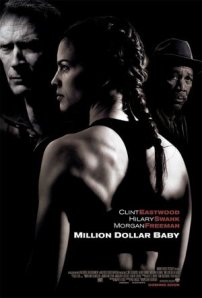Rating: 3 stars (out of 4)
Million Dollar Baby (2004): Dir. Clint Eastwood. Written by Paul Haggis. Based upon the book Rope Burns by F.X. Toole. Starring: Eastwood, Hilary Swank, Morgan Freeman, Jay Baruchel, and Mike Colter. Rated PG-13 for violence, some disturbing images, thematic material and language. Running time: 132 minutes.
 Audiences may have balked when what looked like a female equivalent of Rocky took a decidedly darker turn in its latter half. Yet despite its appearance, Eastwood’s film says more about human relationships than about boxing. It marked a comeback for Eastwood after his win for Unforgiven 12 years earlier.
Audiences may have balked when what looked like a female equivalent of Rocky took a decidedly darker turn in its latter half. Yet despite its appearance, Eastwood’s film says more about human relationships than about boxing. It marked a comeback for Eastwood after his win for Unforgiven 12 years earlier.
In the darkest and bleakest of L.A. gyms, trainer Frankie Dunn reluctantly agrees to coach a spunky amateur boxer named Maggie Fitzgerald. What she lacks in talent (at least initially) she more than makes up for with single-minded determination. But as Maggie wins fight after fight, Frankie realizes she’s begging for a title match—and he’s not sure he can risk wounds to her pride or safety.
More than anything else, Baby represents a conventional story well-told, finding its greatest successes in its smallest moments. It achieves more genuine human connection by showing Frankie stitching up Maggie’s eye than from by heavy-handed boxing metaphor in its script. Frankie and Maggie forge a bond that transcends trainer-boxer and assumes father-daughter implications. Eastwood and Swank have a natural chemistry that is built as much on tension as on collaboration.
Yet while reliably delivered by Morgan Freeman, much of the voiceover feels superfluous. And the script contains some ill-conceived subplots, including a shot at redemption for Freeman’s “Scrap-Iron” Dupris and an unpleasant run-in with Maggie’s hillbilly family. The villains are conceived as cartoons, which serves narrative convenience and little else. I only point out these flaws because the central relationship works so well.
The film might have probed explore the ambiguity of later plot developments, but by the end of Eastwood’s film we’re left with a solid, moving tale that doesn’t usually have to strain for authenticity. The seeming “female version of Rocky” carves out its own niche as a human interest story masquerading as a boxing picture.
Next film: Crash, 2005